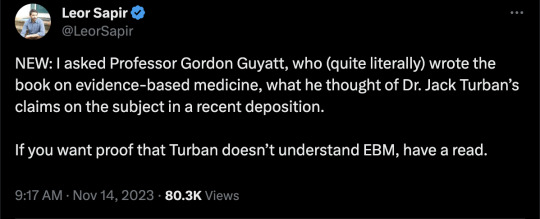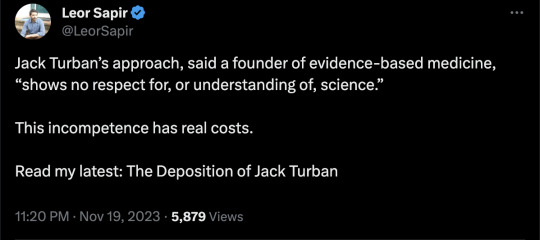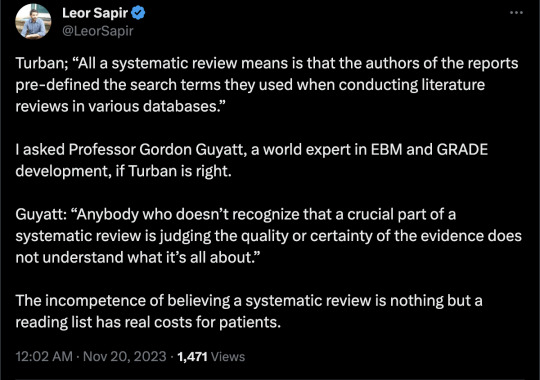#gender confirming care
Text
#talkin#tik tok#elevated access#reproductive healthcare#gender confirming care#reproductive freedom#reproductive health#reproductive rights#reproductive care#gender confirmation surgery#roe v wade
1K notes
·
View notes
Text


Before and after: 10 weeks post-op facial and body harmonization surgery. Performed by Dr. Facque at the Gender Confirmation Center.
#trans man#ftm#trans guy#transgender#transmasculine#transmasc#transition#gender confirmation center#gender affirming care#gender affirming healthcare#gender affirming surgery#gender euphoria#trans joy#transition timeline#nonbinary
84 notes
·
View notes
Text

(sorry for leaving y’all in suspense I was grocery shopping) Surprise!! I accidentally got into Len’en like two weeks ago. Whoops! I got ideas for cool drawings to do with each of the BPoHC shrine team members (and you-know-who, ofc, but that one might be… weird lol), but Tsubakura gets to go first cause theirs is the simplest; just greyscale + red color scheme with a split background and the pose is mostly random (maybe they’re squishing Tsurubami’s little eye thing? Idk). Very pleased with how everything worked out; the line for the eye is exactly where the dividing line for the background was and the way I managed to make the vest corseted while not changing the ribbon placement is just perfect. Although I did make their hat smaller out of the aforementioned cowardice also that thing is hard to draw
#art#digital#len’en#tsubakura enraku#for those not in the know: Len’en is a game series inspired by Touhou but there’s a number of things different about it and it is rapidly#spiraling off into a very complicated story and also other game genres; also every character’s gender is officially ‘whatever’#This character (Tsubakura) plays like Marisa but is also a shrine maiden (priest) along with the Reimu type character#Nonbinary (to me) mad scientist.#Replaces soy sauce with calligraphy ink in every culinary application.#Made a nuclear bomb once supposedly on accident.#Locked in a blood feud with their 3(ish) absurdly powerful ex-girlfriends and this has led to at least one actual war. so far#(hello high brightness users! :D)#Apparently mastered genetic engineering and mostly uses it for stuff like making it so they can put ink in their coffee and not die from it#what’s not to love#oh ya I doubt anyone cares much since this was in the tags but I got some stuff wrong due to misunderstanding & exaggeration for comedy sryy#nuclear bomb was definitely an accident cause they got really sad about it after which is soooooo funny#they do eat ink and also soap but it’s not really explained why it doesn’t kill them of why they like it#also they made an artificial human (+ several androids) who’s supposed to be an assassin and used to be an even more blatant mega reference#hasn’t actually killed anyone yet cause their first target is Tsubakura lol#and I’m barely exaggerating abt the ex girlfriend thing; they haven’t been confirmed to have dated in canon but they were quote#‘close enough to want to murder each other’#and one of them is very homoerotic about it all the time so like rlly not that out of pocket#admittedly the one I’m drawing somewhat homoerotic art of with Tsubakura atm is probably one of the other two but whateverrrr#it still fits Arde well enough#*mgs reference
33 notes
·
View notes
Text
i mean i don't know why i even bother to vote / look at certain polls. they just annoy me.
#sorry i am a deangirl but also a big destielgirl#like those are my main fixations and interests in that order#and i just. i simply do not care abt them kissing other people but also i do not need a canon same-gender kiss to confirm their sexualities#i have eyes. and a brain. i know they're both queer#thee only thing i Want is to see them together and kiss each other#so all these polls are just. infuriating to me esp the one that would trade thee confession for cas kissing some random guy#who wants that !!!!!#EYE want to see dean get told he is loved by cas bc dean deserves to hear that and bc that's more meaningful to the narrative#than cas kissing some random person would be#the other polls like whatever if destiel weren't a thing sure dean can kiss a guy but like.#i very much want destiel to be a thing#i'd rather have the show we got and live in the subtext and queercoding and get to have destiel than see them kiss random guys
14 notes
·
View notes
Text
Dick or no dick confirmation Pickles was always going to be trans to me anyways; if he's swingin' somethin that's phallo babes, if he's not then his t-dick fat. What's not to get.
#metalocalypse#jay talkin#I'm sorry they wrote that awful gross little man far too likeable and relatable to on a trans level#for me not to hoot and holler and cheer for the trans pickles agenda#changes nothing about his character arc or any of the show anyone is capable of being the kind of person he is#don't make the mistake of thinking thats exclusive to cis men#his transness wouldnt change that#only adds on an extra layer to him that i think works fantastically.#Listen that dude was rejected by his family driven to drink and drugs young to escape that ran away to be in a band#is called fucking Pickles of all things and refuses to tell anyone his real last name;#over the span of four seasons and two movies he slowly starts to learn to be for others what he never had#he becomes more caring more supportive#it's not a stretch to say he undoes some of the toxic masculinity he's been keeping himself shielded behind#and learns how to be a kinder man.#all of which have no contradictions with him being trans!#In fact it doesn't take much extra thought to find ways a lot of this can line up with some trans masculine experiences#i mean. Did no one else have a younger phase where they swung as far as they could into crass rude and uncaring ways#to try and assert their masculinity only to grow and realise that you can be a man and be more caring.#Did no one else have father issues. 1 800 come on now i know those are both shared experiences a lot of us have had LOL.#at the end of the day this show aired nearly 20 years ago and is finished. we're not getting more of it#so nothing is altered nor changed if pickles is canonically trans or not ok. its fine#i mean hell i dont even need canon confirmation hes trans to me and thats all i care abt#but i think if yr getting suuuuuper weird abt needing him not to be canonically trans you have some issues#and bio essentialist ideals of gender if you think only a cis man can act like he does#again. anyone can be like that. its not exclusive. him being trans would not change him in any way shape or form lol#AND ALSO GODDDUUUGH for once i love getting to see a guy pushing 50 whos depicted as trans#do you have any idea how dire and barren it is out here. we never get to see a trans guy older than 30 and whos not a pristine model#I WANT MORE OLD SHLUBBY SHITHEAD TRANS GUYS IN MEDIA
9 notes
·
View notes
Note
"he/they" lol
With tits or not, anyone can tell what you are from across the street.
And when you enter a male bathroom, you won't feel """"euphoria"""", you'll feel endangered for a reason
1. yes my pronouns are he/they! i also like pup/pups, and my headmate rowena uses she/her, thank you for checking :)
2. “anyone can tell what you are from across the street” good i love being a faggot. i hope other trans people see me and feel safe <3
3. you saying this as if i have not used the men’s bathroom before in complete comfort without being clocked LMAO. idk why you people pretend to know anything about my life
link to my top surgery gofundme here :)
#diary#top surgery#gender#gender dysphoria#transgender#trans#transsexual#gender transition#gender confirmation surgery#gender affirmation surgery#gender affirming care#non binary#nonbinary#enby
8 notes
·
View notes
Text
.
#It's getting difficult more and more for me to enjoy Jolysui without being dragged to their stupid shippers#Like okay some of the reasons ppl gives to hate it are silly#But their fans are not helping lmao#'Um actually Jolysui is not a straight ship bc he is gender fluid to me🤓👆'#Good for you but when u try to force your hc so much that you genuinely get mad when other ppl see that character in the Canon way#Is pathetic#Anasui is a cis straight man just wears weird fashion like almost Jojo character is not that deep#Now OK probably Jolyne and Anasui are more probably to be queer code but still they aren't in the way ppl want them to.#Araki just said he DIDN'T have a problem if Anasui was a girl#Wich means he is okay with the idea of Jolyne being queer not that Anasui actually is bc he could just confirmed like he did with Dio or#Scarlet Valentine#But again#Anasui is just a result of new artistic concept he wanted to draw and try#This is not against ppl who hc Anasui as queer etc is against those who gets triggered and mocks other for not seeing the same vision#This isn't either against Jolysui enjoyers is against those morons who can't be on peace without the need to bark at others#Seriously Jolysui shippers would be actually more chill if they you just be like#'Yeah Jolysui could be seen as problematic who cares?'#Instead of making bunch of threats about how it doesn't count as proship#Bc ur probably a coward and ultimately not wanting to be bother with ya know bunch of bad wishes from randoms#helenatalks#I'm sorry I just wanted to express my thoughts lmao I'm Lil annoyed.
7 notes
·
View notes
Text
Something I noticed (in kind of regards to my last reblog about Mizuki) is that the people who yell at others for not using they/them on Mizuki are sometimes the same people who yell at trans headcanons for characters of the opposite gender (transmasc l/n, transmasc emunene and anhane, transmasc mmj, transmasc (minus mizuki ofc!) niigo and transfem fantasisita squad). These are the same people who preach about Non-Binary representation and trans representation only to yell at people who headcanon their favorite characters under the trans umbrella.
This is seen mostly in transfem fantasisita squad headcanons :((
Idk it’s upsetting to see others praise Mizuki for being Non-binary (even though she’s a trans girl) and yet belittle other transfem hcs (from what i’ve seen anyway) and trans hcs. I dunno it feels like people are making every excuse in the book to not see transfem as fem/women and transmasc as masc/men.
#pjsk#project sekai#prosekai#thankfully there’s a caring community and so many transmasc and transfem headcanons#but still#so many people in the fandom are against trans hcs#SPECIFICALLY TRANSFEM HCS OR TRANSING THE GENDER OF A CHARACTER TO THE OPPOSITE ONE#I get wanting to get as close to canon as possible#but just like how there are no canon sexualities characters can realize their another gender#or like be non-binary#we really never know#and while sexualities are more easier to confirm than trans rep#idk just leave the silly goofy hcs yk?#like they aren’t hurting anyone#i haven’t seen these lately but they 100% exist#mizuki akiyama#sometimes the prosekai fandom doesn’t deserve her
10 notes
·
View notes
Text
i don't think proseka is a very good game. It's definitely not a very good vocaloid game. but i'm addicted to the little pink diamond that says i did a good job playing and i'm normal about mizuki akiyama
#i'm generally not super intrigued by the project sekai characters. nightcord is the only group i really care about.#but even then. I don't care about the characters in the way the game wants me to. i relate to ena but i don't think they'll ever do anythin#interesting with her character. as is the business model of the game. you CAN'T have an ending to the story because then the content stops#as an neurodivergent person i relate a lot to kanade. but i don't find her all that interesting!#mafuyu has the same problem as ena. i want to like her but she can't know peace if the game wants to keep making money. and also#depression and burnout don't work like a story arc. they always come back.#i like mizuki because i think she's kind of aspirational for me. like out of all of them in the token sad group she actually has her life#together. she has a healthy relationship with her art and she's just herself. i tend to find a lot of transfem characters to be way more#relateable in terms of their relationship with gender expression. despite my agab. i want to be that cute prolific artist femme.#i wish the game would bite the bullet and actually confirm she's transfem. mostly because a lot of people would be happy about it but also#because i'm afraid if she's not transfem. her whole thing would be 'i was a tomboy who rediscovered my femininity' and i HATE that trope.
4 notes
·
View notes
Text







I had facial and body masculinization surgery yesterday. Went well but I’m very swollen and bruised.
#trans man#ftm#trans guy#transgender#transmasculine#gender confirmation center#gender euphoria#gender affirming surgery#gender affirming care#tboy swag#facial masculinization#body masculinization
22 notes
·
View notes
Text
[thoughtfully sipping from a cup of apple juice] TCO has got to be filled with so much rage and fury at all times
#ray's tag#he has laser eyes and fire powers and is a devastatingly competent fighter. theres no way he's normal emotionally or mentally#also to that one guy on here who headcanoned TDL and Victim as both using it/its pronouns: you will likely never see this#but your brain is huge and i agree wholeheartedly#fun fact! the chosen one is the only stick figure in the entire AvA/AvM series who#has canon confirmed pronouns- yellow refers to him with he/him once. nobody else has enough dialogue to confirm nor deny anything else#so that's why i default to they/them for the rest of the sticks#i stubbornly hold that they dont know what gender is. theyre just lines. and if they Do then i get the feeling that they dont rlly care
3 notes
·
View notes
Text
I AM DELIGHTED TO ANNOUNCE THAT I TRANSED THE GENDER OF EVERY! SINGLE! ONE OF MY STAFF! I FINALLY GOT THEM ALL!!!!!!!
#context: i work at a summer camp#last summer i was an area director#that means i had five staff members. they let me be in charge of five people. isnt that wild?#when i started two of them were out as trans#one came out as nonbinary. then one as a trans woman#there was one left and i thought i couldnt turn him#but last week he told me he's some flavor of genderfucked! (not sure of labels yet)#but he confirmed. i managed to trans every single gender#he joked that im the one republicans fear#my transness is contagious#im over here spreading it like the plague#what a strange superpower#careful. dont spend too much time around me#ill trans your FUCKING GENDER#FUCK YEAH I DID IT!!!!!!!
15 notes
·
View notes
Text
i know the translation is partially at fault but y'all cannot look at jang hayoung and think she is not a trans woman like. of course they aren't good about handling her identity. of course they aren't explicit about it. do you really expect the "men in dresses are predators that deserve to be killed" web novel to have well handled trans women in it?? she "doesn't care about gender" but basically goes by she/they, doesn't want anyone referring to her as a man, and literally learns from ngmy who only teaches the skybreaking sword art to women. like. Hello.
#transmisogyny mention#making this one unrebloggable bc of the mention of transmisogynistic violence#and also bc i don't trust anyone on tumblr to not be fucking weird about trans women on this post if it breaks containment#anyways my personal hc is that she's a nonbinary trans woman#cause reminder: you can be both!!#and stating one does not negate the other!#i'm a nonbinary trans man its 100% possible to be both A Gender and Not A Gender. fuck it up get silly with it#also i would need to see the original krn to confirm this#but i suspect the 'not caring about gender' thing is at least Partially a mistranslation#since they were also talking about her being bisexual in that same conversation iirc#(which like. i could not be. i could in fact be remembering INcorrectly asjdhgf so lmk if im wrong)#but yeah i think things got a lil mixed cause her saying she doesnt care abt her own gender kinda goes Against other stuff she does in orv#ky speaks
15 notes
·
View notes
Text
i am once again giggling over MOFFAT of all people understanding (or at least getting extremely lucky in how it comes off) doctor gender better then the two ‘progressive’ writers. incredible stuff
#deadass i think its bc he didnt give a#fuck about making lefties happy he just wanted to say whatever. vs chibs agonized fear over getting things wrong paralyzing him into the#most boring writing on the planet AND forcing him to include the absolute shallowest ‘representation’ on the planet bc he knows he Should#have it but doesnt know how ro actually do that#versus rtd who seems to genuinly really really care about this kind of stuff BUT gets all his info via like. instagram posts and his#experiences with trans ppl begin and end with a drag show he went to once in the 90s where a queen drunkenly explained her theories on#gender to him. so like his hearts in the right place but he is sososo wrong.#anyway. does not bode well for ncuti i must say…. ive been worried abt rtd’s treatment of black characters and while this did not confirm#those fears of it continuing to be as awful as it was back in the day it also doesn’t exactly assuage them. we will see! i will stay#optimistic until i die probably so. fingers crossed ig lol#mi
5 notes
·
View notes
Text



By: Leor Sapir
Published: Nov 13, 2023
Few figures in the medical world generate more controversy than psychiatrist Jack Turban. An assistant professor of child and adolescent psychiatry at the University of California, San Francisco, Turban is one of the leading figures promoting “gender-affirming care” in the United States. He is also regularly criticized for producing deeply flawed research and denying the significant rollback of youth gender transition in Europe.
The American Civil Liberties Union recently retained Turban as an expert witness—paying him $400 per hour—in its legal challenge to Idaho’s Vulnerable Child Protection Act, which restricts access to “gender-affirming” drugs and surgeries to adults only. On October 16, Turban submitted to a seven-hour deposition at the hands of John Ramer, an attorney with the law firm Cooper & Kirk, who is assisting Idaho in the litigation. In the course of the deposition, Turban revealed that, aside from churning out subpar research and misleading the public about scientific findings, he also appears not to grasp basic principles of evidence-based medicine.
Evidence-based medicine (EBM) refers to “the conscientious, explicit, and judicious use of current best evidence in making decisions about the care of individual patients. . . . The practice of evidence-based medicine means integrating individual clinical expertise with the best available external clinical evidence from systematic research.” Because the expert opinion of doctors, even when guided by clinical experience, is vulnerable to bias, EBM “de-emphasizes intuition, unsystematic clinical experience, and pathophysiologic rationale as sufficient grounds for clinical decision making and stresses the examination of evidence from clinical research.” EBM thus represents an effort to make the practice of medicine more scientific, with the expectation that this will lead to better patient outcomes.
Systematic reviews and meta-analyses sit at the top of the hierarchy of evidence in EBM. A key difference between the U.S. and European approaches to pediatric gender medicine is that European countries have changed their clinical guidelines in response to findings from systematic reviews. In the U.S., medical groups have either claimed that a systematic review “is not possible” (the World Professional Association for Transgender Health), relied on systematic reviews but only for narrowly defined health risks and not for benefits (the Endocrine Society), or used less scientifically rigorous “narrative reviews” (the American Academy of Pediatrics). One of the world’s leading experts on EBM has called U.S. medical groups’ treatment recommendations “untrustworthy.”
In the deposition, Ramer asked Turban to explain what systematic reviews are. “[A]ll a systematic review means,” Turban responded, “is that the authors of the reports pre-defined the search terms they used when conducting literature reviews in various databases.” The “primary advantage” of a systematic review, he emphasized, is to function as a sort of reading list for experts in a clinician field. “Generally, if you are in a specific field where you know most of the research papers, the thing that’s most interesting about systematic review is if it identifies a paper that you didn’t already know about.” Ramer showed Turban the EBM pyramid of evidence, which appears in the Cass Review (page 62) of the U.K.’s Gender Identity Development Service. He asked Turban why systematic reviews sit at the top of the pyramid. Turban responded: “Because you’re looking at all of the studies instead of looking at just one.”
Turban’s characterization represents a fundamental misunderstanding of what EBM is and why systematic reviews are the bedrock of trustworthy medical guidelines.
First, even if the only thing that makes a review systematic is that it “pre-defines the search terms,” Turban failed to explain the relevance of this. A major reason systematic reviews rank higher than narrative reviews in EBM’s information hierarchy is that systematic reviews follow a transparent, reproducible methodology. Anyone who applies the same methodology and search criteria to the same body of research should arrive at the same set of conclusions. Narrative reviews don’t use transparent, reproducible methodologies. Their conclusions are consequently more likely to be shaped by the personal biases of their authors, who may, for instance, cherry-pick studies.
To achieve transparency and reproducibility, systematic reviews define in advance the populations, interventions, comparisons, and outcomes of interest (PICO). They search for and filter the available literature with Preferred Reporting Items for Systematic Reviews and Meta-Analyses. Authors register their methodology and search criteria in advance in databases such as PROSPERO. These steps are meant to minimize the risk that authors will change their methodology midway through the process in response to inconvenient findings.
Turban acknowledged that pre-defining the search terms “makes it a little bit easier for another researcher to repeat their search.” However, he did not seem to grasp that the additional steps introduced by systematic reviews are designed to reduce bias and improve accuracy. Turban, one should note, endorses the American Academy of Pediatrics’ 2018 narrative review—a document that, with its severe flaws, perfectly illustrates why EBM prefers systematic to narrative reviews.
Second, Turban is incorrect that the “primary advantage” of the systematic review is to generate a comprehensive reading list for (in this case) gender clinicians. Systematic reviews also assess the quality of evidence from existing studies. In other words, they avoid taking the reported findings of individual studies at face value. This is especially important in gender medicine because so much of the research in this field comes from authors who are professionally, financially, and intellectually invested in the continuation of gender medicine—in other words, who have conflicts of interest. Financial conflicts of interest are typically reported, but professional and intellectual conflicts rarely so. Conflicted researchers frequently exaggerate positive findings, underreport negative findings, use causal language where the data don’t support it, and refrain altogether from studying harms. In short, assessing the quality of evidence is especially important in a field known for its lack of equipoise and scientific rigor.
In EBM, quality of evidence is a technical term that refers to the degree of certainty in the estimate of the effects of a given intervention. The higher the quality, the more confident we can be that a particular intervention is what causes an observed effect. It was only in response to Ramer’s prodding that Turban addressed “the risk of bias associated with primary studies”—namely, one of the key considerations for assessing quality of evidence.
During the deposition, Ramer read Turban excerpts from Users’ Guides to the Medical Literature, a highly regarded textbook of EBM published by the American Medical Association. Ramer asked Turban to explain what the Users’ Guides means when it says that narrative reviews, unlike systematic reviews, “do not include systematic assessments of the risk of bias associated with primary studies and do not provide quantitative best estimates or rate the confidence in these estimates.” Turban responded that systematic reviews do sometimes assess the quality of evidence, but that this is not a necessary condition for a review to be called systematic.
I asked Gordon Guyatt, professor of health research methods, evidence, and impact at McMaster University, what he thought of Turban’s answer. Guyatt is widely regarded as a founder of the field of EBM and is the primary author of Users’ Guides. “The primary advantage of a systematic review,” Guyatt assured me, “is not only not missing studies, but also assessing quality of the evidence. Anybody who doesn’t recognize that a crucial part of a systematic review is judging the quality or certainty of the evidence does not understand what it’s all about.”
Ramer asked Turban to explain the GRADE method (Grading of Recommendations Assessment, Development and Evaluations), a standardized EBM framework for evaluating quality. “GRADE generally involves looking at the research literature,” Turban explained. “And then there’s some subjectivity to it, but they provide you with general guidelines about how you would—like, great level of confidence in the research itself. Then there’s a—and then each of those get GRADE scores. I think it’s something like low, very low, high, very high. I could be wrong about the exact names of the categories.” Turban is indeed wrong: the categories are high, moderate, low, and very low. It’s surprising that someone involved in the debate over gender-medicine research for several years, and who understands that questions of GRADE and of quality are central, doesn’t know this by heart.
Ramer asked Turban what method, if any, he uses to assess quality in gender-medicine research. Turban explained that he reads the studies individually and does his own assessment of bias. GRADE is “subjective,” and this subjectivity, Turban said, is one reason that the U.K. systematic reviews rated studies that he commonly cites as “very low” quality. Turban’s thinking seems to be that, because GRADE is “subjective,” it is no better than a gender clinician sitting down with individual studies and deciding whether they are reliable.
I asked Guyatt to comment on Turban’s understanding of systematic reviews and GRADE. “Assessment of quality of evidence,” he told me, “is fundamental to a systematic review. In fact, we have more than once published that it is fundamental to EBM, and is clearly crucial to deciding the treatment recommendation, which is going to differ based on quality of evidence.” Guyatt said that “GRADE’s assessment of quality of the evidence is crucial to anybody’s assessment of quality of evidence. It provides a structured framework. To say that the subjective assessment of a clinician using no formal system is equivalent to the assessment of an expert clinical epidemiologist using a standardized system endorsed by over 110 organizations worldwide shows no respect for, or understanding of, science.”
At one point, Ramer pressed Turban to explain his views on psychotherapy as an alternative to drugs and surgeries. Systematic reviews have rated the studies Turban relies on for his support of puberty blockers and cross-sex hormones “very low” quality in part because these studies are confounded by psychotherapy. Because the kids who were given drugs and improved were also given psychotherapy and the studies lack a proper control group, it is not possible to know which of these interventions caused the improvement.
Turban seemed not to grasp the significance of this fact. If hormonal treatments can be said to cause improvement despite confounding psychotherapy, why can’t psychotherapy be said to cause improvement despite confounding drugs?
The exchange about confounding factors came up in the context of Ramer asking Turban about an article he wrote for Psychology Today. The article, aimed at a popular audience, purports to give an overview of the research that confirms the necessity of “gender-affirming care.” Last year, I published a detailed fact-check of the article, showing how Turban ignores confounding factors, among other problems. Four days later, Psychology Today made a series of corrections to Turban’s article. Some of these corrections were acknowledged in a note; others were done without any acknowledgement. In the deposition, Ramer asked Turban about my critique, to which Turban replied that he “left Psychology Today to do whatever edits they needed to do,” and that, when he later read the edits, he found them “generally reasonable.”
In sum, though Turban says that “there are no evidence-based psychotherapy protocols that effectively treat gender dysphoria itself,” the same studies he cites furnish just as much evidence for psychotherapy as they do for puberty blockers or cross-sex hormones—which is to say “very low” quality evidence.
Other remarkable moments occur in the Turban deposition. For instance, when asked whether he had read the Florida umbrella review (a systematic review of systematic reviews) conducted by EBM experts at McMaster University and published over a year ago, Turban said that he hadn’t because he “didn’t have time.” When I mentioned this confession to Guyatt, he seemed taken aback. How could a clinician who claims expertise in a contested area of medicine not be curious about a systematic review of systematic reviews? “If all systematic reviews come to the same conclusion,” Guyatt told me, “it clearly increases our confidence in that conclusion.” (My conversation with Guyatt dealt exclusively with Turban’s claims and how they stack up against EBM. I did not ask Guyatt about, and he did not opine on, the wisdom of state laws restricting access to “gender-affirming care.”)
I believe that Turban is being honest when he says he didn’t read the Florida umbrella review. He doesn’t seem interested in literature that might call his beliefs into question. He has staked his personal and professional reputation on a risky and invasive protocol before the appearance of any credible evidence of its superiority to less risky alternatives. Turban regularly maligns as bigoted and unscientific anyone who disagrees with him. Some gender clinicians in Europe now admit that the evidence is weak, the risks serious, and the protocol still experimental. Turban, however, would seemingly rather go down with the sinking ship than admit that he was too hasty in promoting “gender-affirming care.”
Put another way, Turban has intellectual, professional, and financial conflicts of interest that prejudice his judgment on how best to treat youth experiencing issues with their bodies or sex. European health authorities are aware of this problem; that’s why they chose to commission their evidence reviews from clinicians and researchers not directly involved in gender medicine. For instance, England’s National Health Service appointed physician Hilary Cass to chair the Policy Working Group that would lead the investigation of its Gender Identity Development Service and its systematic reviews. The NHS explained that there was “evident polarization among clinical professionals,” and Cass was “asked to chair the group as a senior clinician with no prior involvement or fixed views in this area.”
Unfortunately, in the U.S., personal investment in gender medicine is often seen as a benefit rather than a liability. James Cantor, a psychologist who testifies in lawsuits over state age restrictions, emphasizes the difference between the expertise of clinicians and that of scientists. The clinician’s expertise “regards applying general principles to the care of an individual patient and the unique features of that case.” The scientist’s expertise “is the reverse, accumulating information about many individual cases and identifying the generalizable principles that may be applied to all cases.” Cantor writes:
In legal matters, the most familiar situation pertains to whether a given clinician correctly employed relevant clinical standards. Often, it is other clinicians who practice in that field who will be best equipped to speak to that question. When it is the clinical standards that are themselves in question, however, it is the experts in the assessment of scientific studies who are the relevant experts.
The point is not that clinicians are never able to exercise scientific judgment. It’s that conflicts of interest for involved clinicians need to be acknowledged and taken seriously when “the clinical standards . . . are themselves in question.” Unfortunately, the American propensity for setting policy through the courts makes that task difficult. Judges intuitively believe that gender clinicians are the experts in gender medicine research. The result is a No True Scotsman argument wherein the more personally invested a clinician is (and the more conflict of interest he has as a result), the more credible he appears.
Last year, a federal judge in Alabama dismissed Cantor’s expert analysis of the research, citing, among other things, the fact that Cantor “had never treated a child or adolescent for gender dysphoria” and “had no personal experience monitoring patients receiving transitioning medications.” Turban’s deposition illustrates why this thinking is misguided. It is precisely gender clinicians who often seem to be least familiar, or at any rate least concerned, with subjecting their “expert” views to rigorous scientific scrutiny. It is precisely these clinicians who are most likely to be swimming in confirmation bias, least interested in the scientific method, and, conveniently, least concerned with evidence-based medicine.
==
Jack Turban is frequently a star "expert" in so-called "gender affirming care" enquiries. Aside from being a pathological liar, we can now also conclude he's dangerously unqualified.
#Leor Sapir#Jack Turban#Gordon Guyatt#evidence based medicine#gender affirming care#gender affirmation#gender affirming healthcare#dangerously unqualified#gender ideology#queer theory#conflict of interest#confirmation bias#medical scandal#medical malpractice#ideological corruption#gender activism#religion is a mental illness
4 notes
·
View notes
Text
This is what gender affirming health care really is
youtube
One tactic used by anti-trans haters is to disseminate false information about what gender affirming care is. This especially applies to the life of transgender kids.
In the US the latest example of such fear-mongering is given by Brittany Aldean, wife of country star Jason Aldean, who have been thanking her parents for allowing her to go through a “tomboy” phase and not “changing my gender.”
Billboard’s Stephen Daw writes:
Dr. Joshua D. Safer, MD, executive director of the Mount Sinai Center for Transgender Medicine and Surgery [photo below] , says that when medical intervention becomes necessary, there are a number of different procedures minors can undergo. Those who have yet to start puberty may begin their transition process using puberty blockers — medication meant to “pause puberty” for up to a year to prevent permanent physical change. Puberty blockers have long been used for cisgender patients experiencing puberty “before the medical system considers them socially ready,” he says...
“Young people don’t do too much that is irreversible. Prior to puberty, there is no medical intervention,” Dr. Safer explains. “Even puberty blockers are reversible. In later teenage years, well-established patients may begin hormone treatment. Although there can be irreversible breast development (naturally or with hormones) or irreversible facial hair growth (depending on which hormones are being used), fertility remains intact and there is recourse.”

Let me add one important fact here: For a transgender person puberty will be experience like a “medical intervention” that causes irreversible changes to the body. So not providing a transgender youth with puberty blockers and other forms for help, is also an active choice that changes their life for ever.
Photo: MDedge News
19 notes
·
View notes